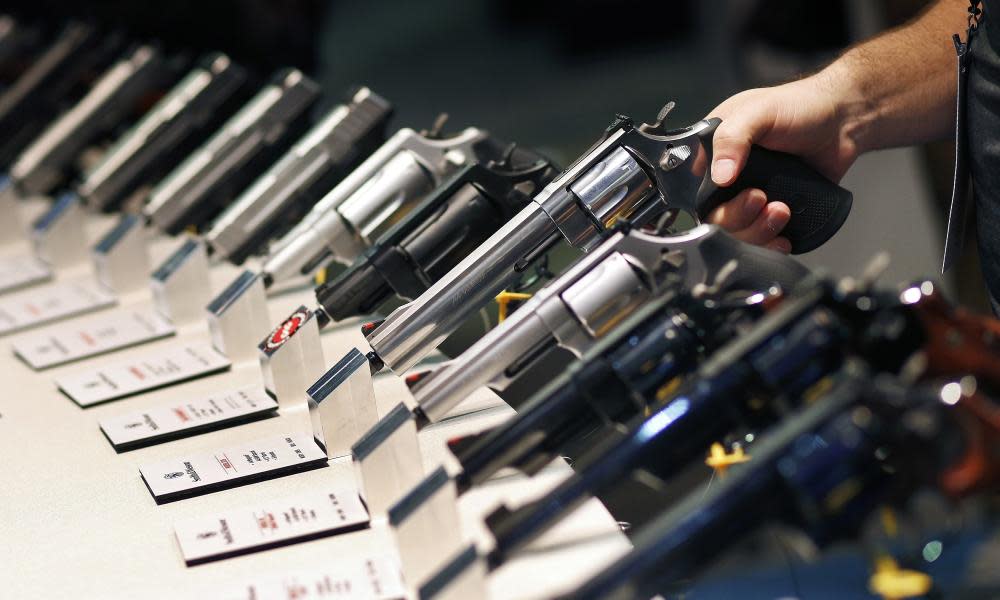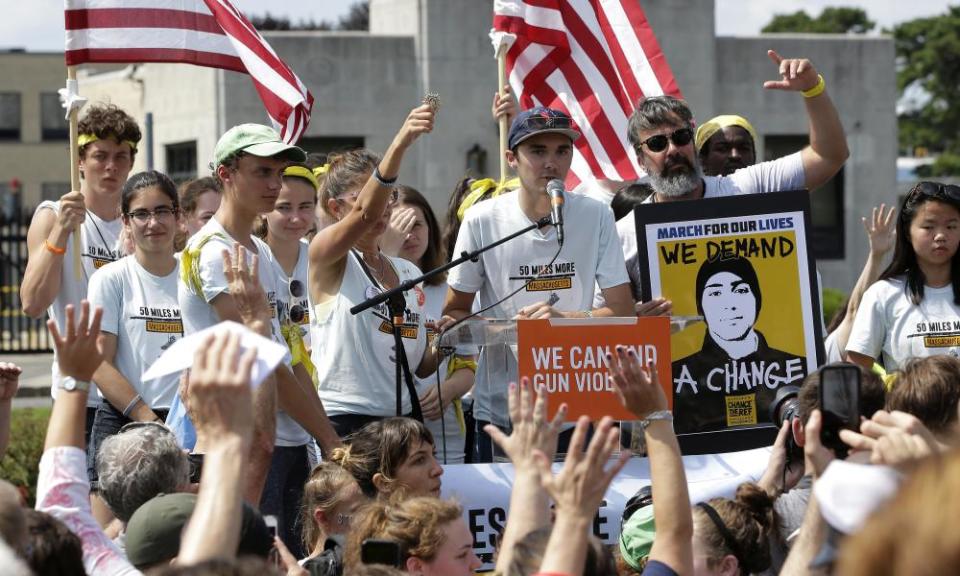'We need everyone involved': activist nuns pressure Smith & Wesson over gun safety

The school shooter who killed 17 people in Parkland, Florida, this February had an AR-15-style gun manufactured by Smith & Wesson. So did the shooter who killed a dozen people at a movie theater in Aurora, Colorado, in 2012, and the shooters who opened fire on the staff of a county health department in San Bernardino in 2015.
Now, a coalition of American nuns is pressuring Smith & Wesson, which rebranded itself as “American Outdoor Brands”, to produce a report for shareholders outlining how the company is monitoring “violent events associated with” its products, and what efforts it is making to “produce safer guns”.
Sister Judy Byron, representing the Sisters of the Holy Names of Jesus and Mary, is leading the shareholder resolution effort, backed by 10 other religious groups, including Catholic Health Initiatives, the Sisters of Bon Secours, USA and the Sisters of St Francis of Philadelphia.
“We need everyone’s involvement: legislators, citizens, police, but we also also need the gun manufacturers to be involved in ending gun violence,” Byron said.
The company’s shareholders will hear Byron’s resolution during a virtual shareholder meeting on Tuesday. A similar resolution at Sturm Ruger, another major gun manufacturer, passed with 69% support from shareholders in May, Byron said.
The nearly 70% vote in favor of Sturm Ruger producing a report was one of the largest votes in favor of a social resolution, said Byron, who has worked with the Northwest Coalition for Responsible Investment for two decades, and is currently the group’s director.
Gun manufacturers and sellers faced intense pressure and scrutiny from the financial sector after the 14 February school shooting in Parkland. The success or failure of Tuesday’s shareholder resolution effort will signal whether that pressure has lessened in the seven months since the Marjory Stoneman Douglas shooting, or whether major investors are still concerned that a failure to act on gun violence prevention might damage gun companies’ prospects.

“I think the shareholders of these companies are concerned about the long-term sustainability of the company. If they don’t take some of these steps, will they continue to exist?” Byron said.
“We are not asking that they stop manufacturing guns. We realize that we are going to have guns in our society,” Byron said. What the activists shareholders want gun companies to do is “to monitor their distribution chains” to see how guns get into the wrong hands, and “we’d like them to be involved in lobbying more for universal background checks and federal funding for gun safety research, and to also let us know what they’re researching in terms of safer weapons”.
“In this age when technology is touching everything, it doesn’t make sense that it isn’t touching firearms,” Byron said, referencing the development of smart gun technology that has not been widely adopted by major firearms companies.
In early March, just two weeks after the Parkland shooting, BlackRock, a major investor in both American Outdoor Brands and Sturm Ruger, posted a public statement about what it was doing to respond to the “terrible toll from gun violence in America”.
As well as allowing its clients to opt out of investing in civilian firearms manufacturers altogether, BlackRock, which manages more than $6tn in assets, said it wanted to talk to gun companies about responsible business practices.
The company wrote to American Outdoor Brands asking a series of questions that paralleled many of the inquiries of the women’s religious groups. BlackRock asked how the gun company was “managing the reputational, financial and litigation risk associated with manufacturing civilian firearms”, how it assessed the risks of its different products, and what steps it was taking to monitor and support the safe use of its products, including any research and development efforts to make guns safer.
American Outdoor Brands responded with a defiant public letter to BlackRock. The firearms company argued that “the first course of action must be to enforce existing laws” and “address the challenges of acute mental illness in our society” and that “the solution is not to take a politically motivated action that has an adverse impact on our company” as well as “the rights of our law abiding customers”.
“Any discussion of our business certainly must start with the second amendment, which confers a fundamental right, expressly provided in the Bill of Rights, to keep and bear arms,” the company wrote.
The company also publicly shared a document from the National Shooting Sports Foundation, the trade association for gun manufacturers, raising questions about the reliability of current “smart gun” technology, and how much demand there might be for this technology from consumers.
American Outdoor Brands did not immediately respond to a request for comment on Tuesday’s shareholder resolution.
Other activists, including a group of law enforcement officials and public health professionals organized by the Industrial Areas Foundation, are also publicly advocating for American Outdoor Brands to “develop and carry out a comprehensive plan to minimize the harmful impacts of its products”.
Byron, a former school teacher and principal, said that when she was working in schools in the 1990s, “we had earthquake drills and fire drills, but never lockdowns or active shooters”.
“When Sandy Hook happened, at that time, I thought, ‘If this doesn’t cause change, nothing will,’” she said.
But she said the activism of the Parkland high school students who spoke out against the National Rifle Association and pro-gun politicians after their classmates were killed had transformed the political landscape in a way that adults advocacy had not, and noted that the Parkland students continue to register other students to vote and travel across the country.
This summer, Byron said, she met a local high school student volunteering to support a gun safety ballot measure in Washington, who mentioned that he would have to work fewer hours in the fall, when he had to go back to school.
“We can’t let the young people do the heavy lifting on this,” Byron said. “We need legislators, we need grandmas, we need moms … we need everyone working to solve this.”

 Yahoo News
Yahoo News 
